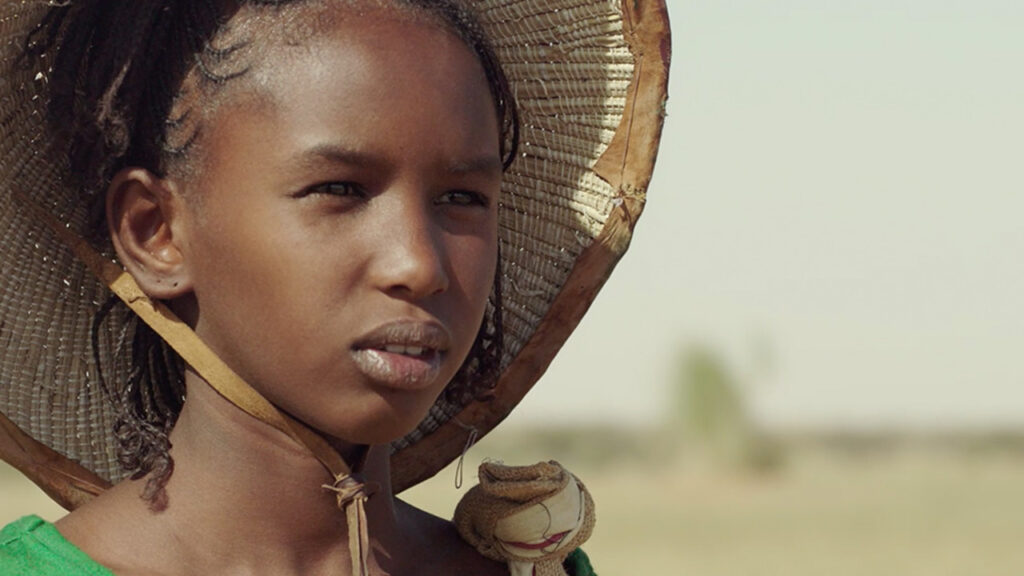My continued coverage of the Toronto International Film Festival’s African cinema programming included three more gems: Ramata-Toulaye Sy’s coming-of-age short film “Astel” from Senegal, Khadar Ayderus Ahmed’s romantic drama “The Gravedigger’s Wife” from Somalia, and Jean Luc Herbulot’s genre-defying thriller “Saloum.” Finding raw emotions in both subtle familial drama and larger-than-life situations, these filmmakers each explore how location and interpersonal relationships affect our sense of self.
In her debut short “Astel,” writer/director Ramata-Toulaye Sy introduces us to the titular Astel, a spunky 13-year-old girl (Hawa Mamadou Dia) who would rather spend time with her father (Cherif Amadou Diallo) herding cows than working the fields with her mother (Khady Diallo). One day the two encounter another (male) shepherd in the bush, prompting Astel’s father to realize his daughter is coming-of-age and it may no longer be safe for her to accompany him. Pushing her to join her mother for dinner one night, Astel reluctantly acquiesces, with Dia’s longing glances back towards her father as she takes her place among her mother and the village’s other women saying more than words ever could.
Sy teases out the changing family dynamics subtly, allowing Astel’s slow understanding of exactly what is happening to form organically. Dialogue is employed economically, with much of the storytelling boiiled down to glances and reactions, smiles, and eye contact. Sy has brought together a talented crew to bring her vision to life. Amine Berrada’s lush cinematography captures the beauty of both the gorgeous purple dawn and washed out browns of the field, with Fatimata Sow’s vibrant costuming adding pops of color and distinct personality to each of Sy’s carefully crafted characters. Amine Bouhafa’s playful guitar and violin score blends seamlessly with the natural sounds of birds and cows, adding depth and sense of place to this world. “Astel” is an incisive and delicate debut short, and I cannot wait to see what Sy creates next.

Finnish-Somali writer/director Khadar Ayderus Ahmed’s tender romance “The Gravedigger’s Wife” follows Guled (Omar Abdi), as he spends his days waiting outside the hospital in Djibouti City with his friends for bodies to bury. He lives in relative poverty with his doting wife Nasra (Yasmin Warsame) and their son Mahad (Kadar Abdoul-Aziz Ibrahim). When Nasra’s failing health due to a kidney infection sends the family into a tailspin, Guled and Mahad each seek money for her much-needed surgery.
Estranged from their families decades early for defying their villages with their marriage and their move to the big city, Guled heads on a journey home in an attempt to raise the money selling his share in the family herd of goats. Meanwhile the rebellious, yet enterprising Mahad and his friend head to the streets to hustle for the money doing menial tasks for others.
Abdi and Warsame’s chemistry is sensual and steamy; you truly believe they fell in love at first sight and ran off to the city together. One particularly lovely scene shows the two “borrowing” a goat in order to crash a wedding, so the two can share a romantic dance before Nasra’s illness strikes her bedridden. Ibrahim gives a complex performance as their son who resents their poverty and illiteracy, but whose love runs deeper than maybe he even realized. Ahmed wisely allows his actors the room to be playful amongst the film’s dramatic plot, bringing a true sense of familial bonds. Charming and wistful without ever feeling maudlin, “The Gravedigger’s Wife” is a beautiful love letter to the power of family.

Congolese-born writer/director Jean Luc Herbulot’s second feature film “Saloum,” which had its world premiere as a Midnight Madness selection, defies genre and is probably best watched knowing as little about it as possible. Featuring dialogue in French, English, Spanish, and Wolof, as well as sign language, the film is a true pan-African film. The action begins during the 2003 coup d’état in Guinea-Bissau, as a trio of mercenaries known as Bangui’s Hyenas extract a drug dealer—along with his gold and drugs. As the four make their way toward Dakar, their plane goes down just outside of the coastal river region of the Sine-Saloum Delta. As they spend time in a rural hotel waiting for fuel and resin to repair their plane, it becomes clear that not only does the village have a secret, but their leader does as well.
Yann Gael sizzles as the trio’s lead Chaka. Oozing charisma and pathos, Gael has the swagger of a born leader, but as the film progresses we get a glimpse of the past that haunts him. There’s a real lived-in feeling to Bangui’s Hyenas, Gael’s chemistry with his partners Rafa (Roger Sallah) and Minuit (Mentor Ba) made me wish we had a whole prequel series so I could keep watching their adventures.
Clearly influenced by the likes of “From Dusk Till Dawn” and “Predator” are clear, Herbulot’s infusion of both African-Caribbean folklore with a soulful meditation on the real-life horrors of Africa’s current state of social-political upheaval, make “Saloum” a refreshingly original action-horror hybrid. It’s also just really damn cool.












